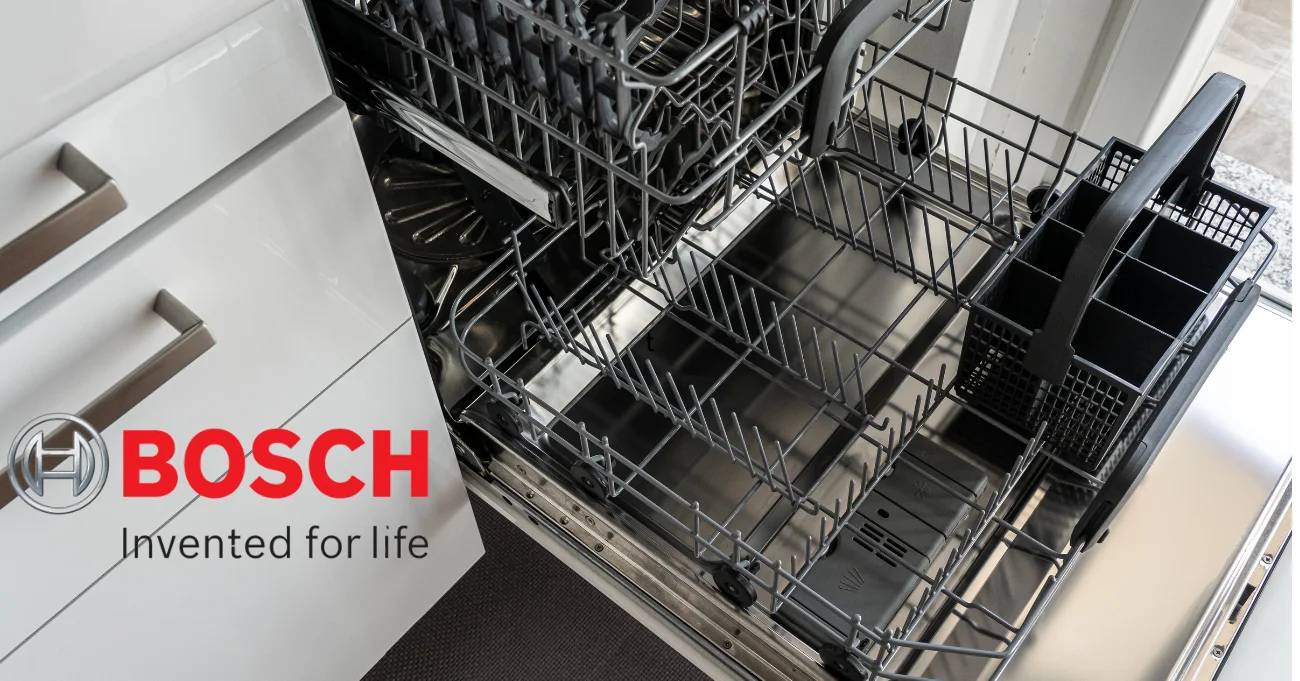In 2009, appliance maker Bosch issued a voluntary recall on 476,000 dishwashers, which would balloon to over 1,000,000 total recalled units in 2017. The Bosch dishwasher recall hinged on electrical issues that caused the devices to overheat, with some even causing fires. At Sparrow, we specialize in class action discovery, providing up-to-date info on all the latest recalls and settlements. Whether it’s consumer goods cases like the Bosch dishwasher recall and Unilever lawsuit or data privacy ones like the TaxAct class action lawsuit, we can provide all of the need-to-know details. We assist eligible class members through the entirety of the claims filing process. With our extensive experience in tracking product recalls and the class actions that are often linked to them, we’ve put together this blog to inform you on what the Bosch dishwasher recall means for you. We’ll take a look at the specifics of the issue and how Bosch responded to the issue to protect its users and maintain product integrity. We’ll also enumerate the affected models, and the necessary steps to ensure your safety. Let’s dive in!Reasons for the Bosch Dishwasher Recall
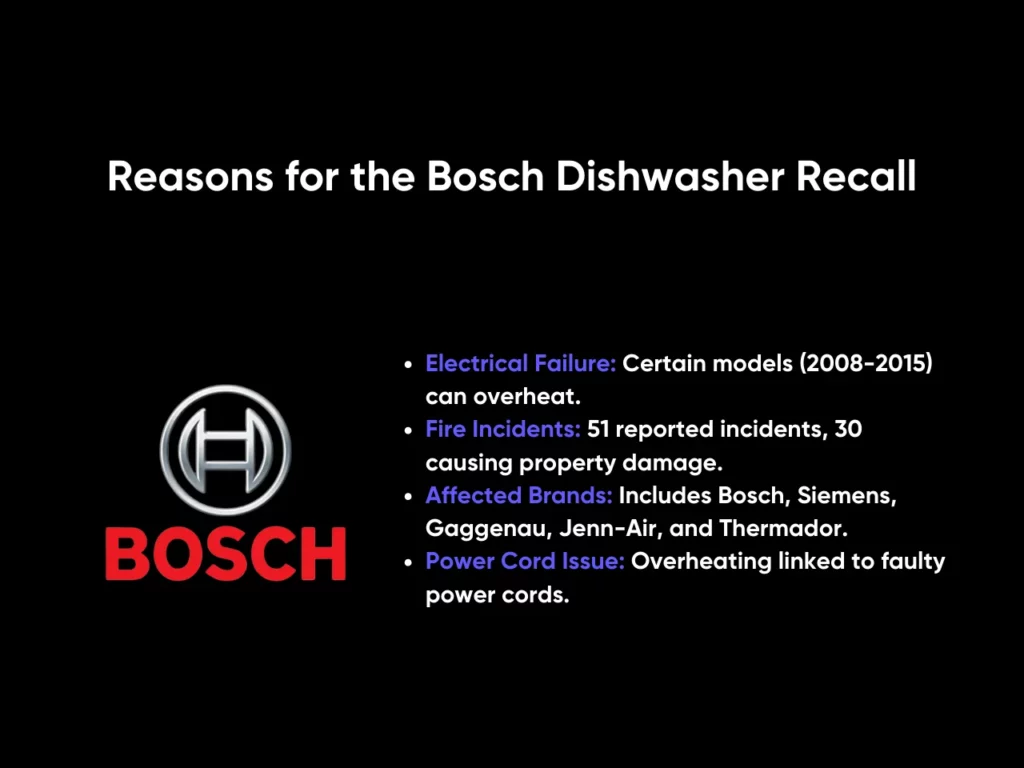
At the center of the Bosch dishwasher recall is an electrical failure that can cause overheating in certain models that were manufactured in certain periods between 2008 and 2015. Bosch began issuing recalls in 2009 following a series of 51 incidents of fires, 30 of which resulted in property damage. Serious safety issues were discovered in dishwashers from Bosch, Siemens, Gaggenau, Jenn-Air, and Thermador. These brands are all owned by BSH Home Appliances Corporation, also known as Bosch-Siemens Hausgeräte (BSH Hausgeräte). The company is known for creating many types of consumer products, including ovens, microwaves, refrigerators, and laundry appliances as well as dishwashers. After an inquiry, the fault was found to be localized to the power cords, which can cause overheating during the device’s operation. Bosch’s Response to the Issues
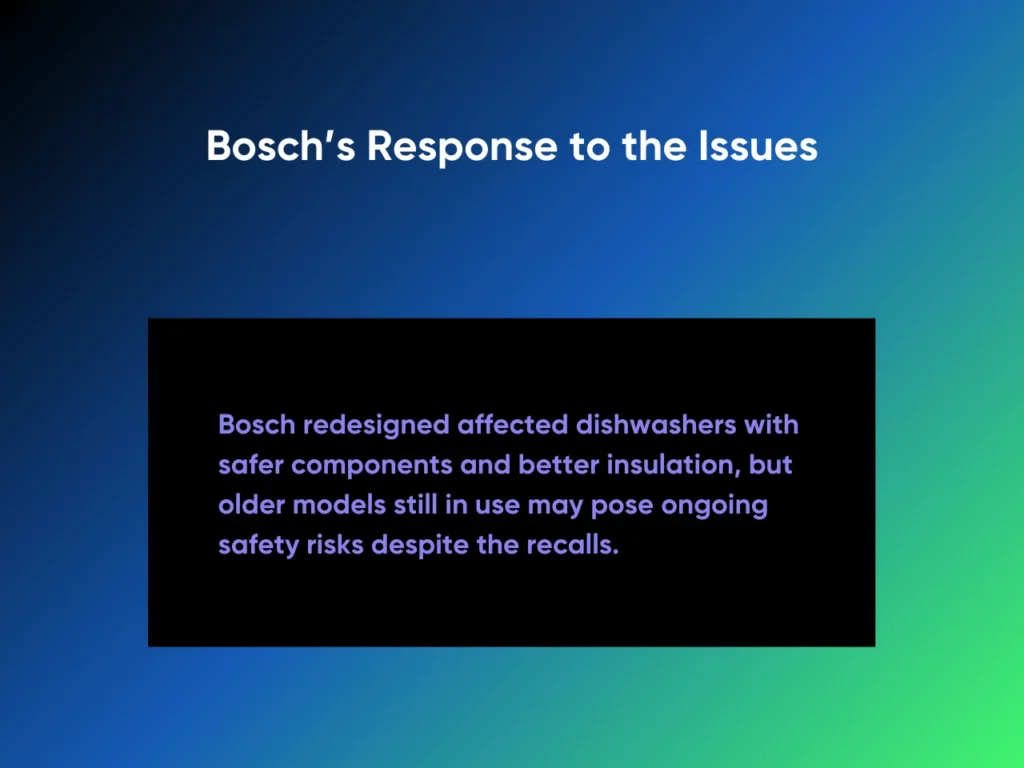
Specifically, the issue lay in the part of the power connection that was hardwired into the appliance’s junction box. To address the issue, Bosch redesigned the affected dishwashers, introducing updated models with safer electrical components and improved power cord insulation. However, despite Bosch’s efforts, some older, affected models remained on the market. These dishwashers may still be in use today, posing ongoing safety risks to consumers unaware of the recall actions. After reports of fires, the U.S. Consumer Product Safety Commission (CPSC) began overseeing recalls by Bosch starting in 2009. While the dishwashers were redesigned after the 2009 recalls, new power cord issues continued to appear until 2017.Summary of Recalls
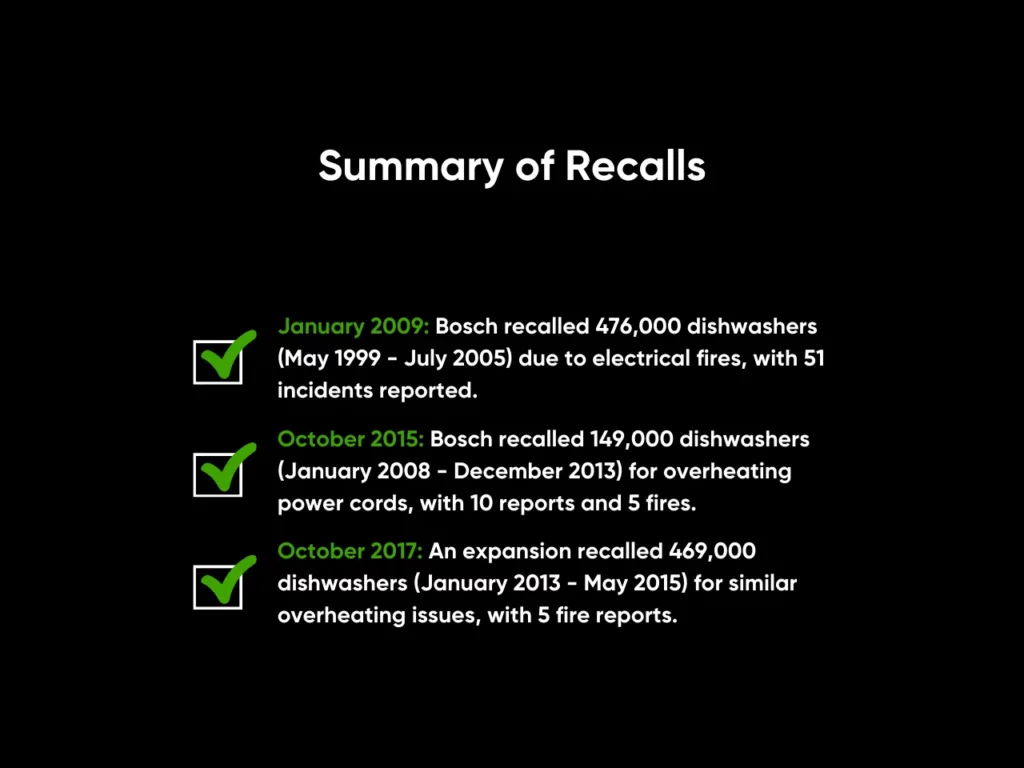
The Bosch dishwasher recall was expanded multiple times since the initial recall in 2009. Here is what each of the Bosch dishwasher recalls have entailed: 476,000 dishwashers built between May 1999 through July 2005 were recalled following reports that their electrical components caught fire. Several Bosch and Siemens model dishwashers were involved, with 51 fire incidents being documented. Although 30 of these incidents involved actual property damage, no injuries were reported. The initial recall was a general safety recall, in which affected models were checked by Bosch technicians for issues, with subsequent repairs being conducted for free. Bosch states that dishwasher models from this time possessed a hardwire connection to the junction box at the front of the appliance. BSH reports that all of the affected models were manufactured in their facility in North Carolina. 149,000 Bosch dishwashers, manufactured between January 2008 and December 2013, were recalled due to overheating issues in their power cords. This recall followed 10 reports of overheating, five of which resulted in fires that caused property damage. Thankfully, no injuries were reported. Consumers were advised to immediately stop using the affected dishwashers and contact BSH Home Appliances for a free inspection and repair. The recalled dishwashers were sold between January 2009 and May 2014 at various retailers in the US and Canada, including department stores, specialty retailers, and home improvement stores. Bosch stated that the affected models were manufactured in the United States and Germany. A recall expansion called for an additional 469,000 Bosch dishwashers to be recalled due to overheating issues, similar to previous recalls. This recall involved dishwashers sold between January 2013 and May 2015, and was issued after BSH Home Appliances received five reports of the power cords overheating, which resulted in fires and property damage. Fortunately, no injuries were reported. Identifying whether your Bosch dishwasher is affected by the recall is crucial for ensuring your safety. Here is a list of the affected models as of October 2017:January 2009 – Recall #09-100
October 2015 – Recall #16-003
October 2017 – Recall#18-013
Affected Models and Serial Numbers
January 2009 – Recall #09-100
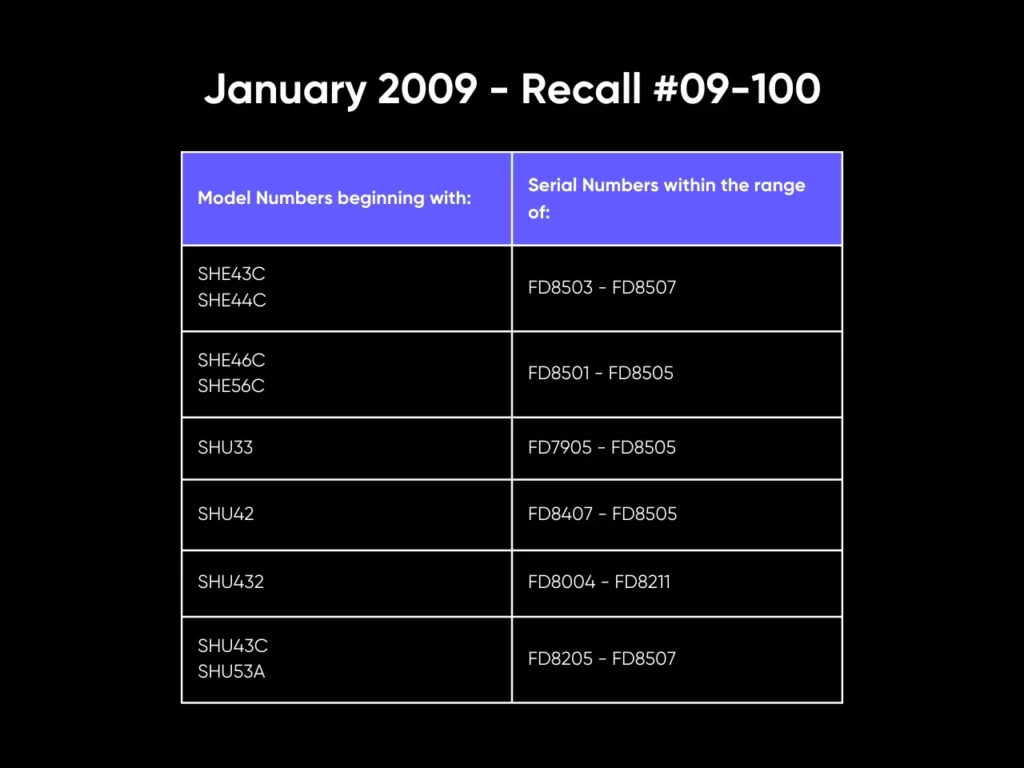
If you own a Bosch dishwasher, it may be best to verify whether it’s part of the Bosch recalls issued over the years to prevent an unfortunate mishap, especially if you’ve noticed that your particular unit has been having operational difficulties lately. Bosch continues to provide free repairs for all affected models. Here’s what you can do to avail of it.October 2015 – Recall #16-003
October 2017 – Recall#18-013
Steps to Take if Your Bosch Dishwasher is Recalled
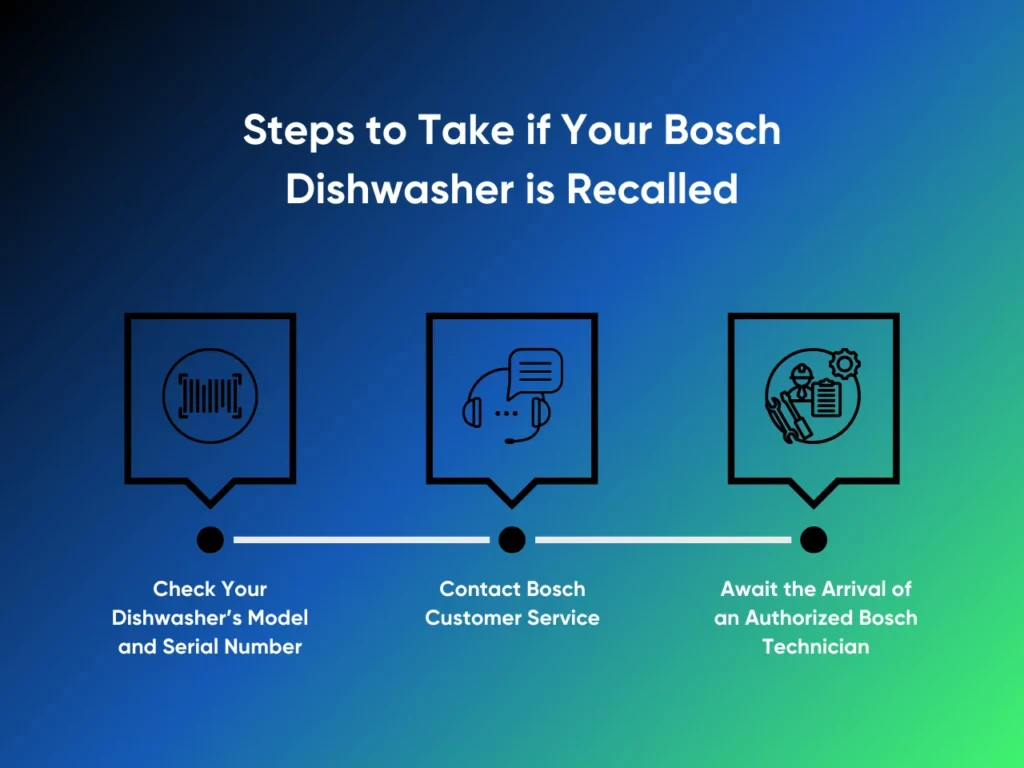
If you suspect your dishwasher is part of the Bosch dishwasher recall, the first step is to confirm its status. You can visit the Bosch dishwasher power cord recall website and use their search engine to confirm whether your dishwasher is one of the models that have been recalled. You can find your dishwasher’s model and serial number in the interior of the appliance, printed on the top of the inner door panel, or on the side of the dishwasher panel. Note that not all dishwashers of the same model are accepted by Bosch’s recall program, so make sure your appliance’s serial number is included in the list on the recall website. If your dishwasher is one of the affected units, you should immediately stop using the dishwasher to prevent any potential safety issues. Once you’ve verified that your dishwasher is one of the models that have been recalled, contact Bosch customer service for guidance. You can also use the Bosch dishwasher power cord recall hotline:(888) 965-5813, which is attended on weekdays from 8 AM to 5 PM. Bosch customer service can assist you in scheduling necessary repairs or replacements. They has implemented compensation programs for affected consumers, ensuring that safety concerns are addressed promptly and efficiently.Step 1: Check Your Dishwasher’s Model and Serial Number
Step 2: Contact Bosch Customer Service
Step 3: Await the Arrival of an Authorized Bosch Technician
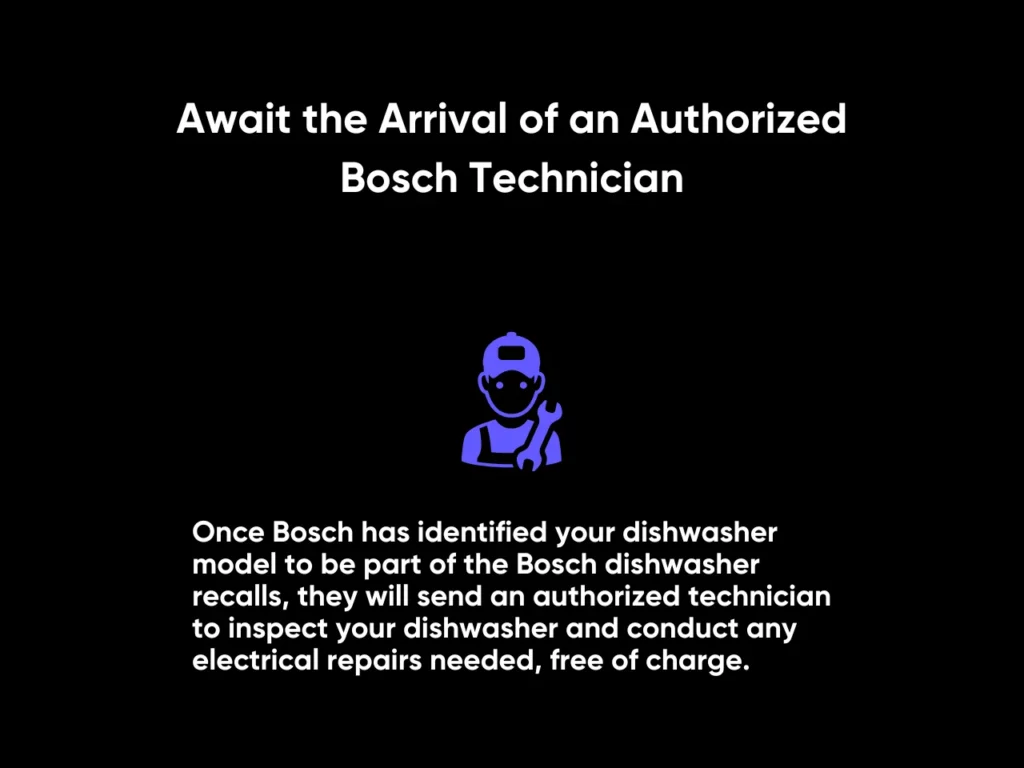
Once Bosch has identified your dishwasher model to be part of the Bosch dishwasher recalls, they will send an authorized technician to inspect your dishwasher and conduct any electrical repairs needed, free of charge. For your safety, owners are not advised to conduct their own repairs on their appliances. Although the most recent Bosch dishwasher recall was in 2017, Bosch remains committed to prioritizing the safety of consumer products that they sell and ensuring customers get as much value as possible from their purchase. If you’ve purchased an affected model, please make sure to contact Bosch immediately to schedule an inspection and get any needed repairs done right away, even if you have not experienced any issues with your unit.Key Takeaway
There have not been any class actions filed against Bosch for their design oversights that have spanned multiple years thus far. However, this may change in the future, if further flaws come to light. Instances of issues such as the Bosch dishwasher door spring recall continue to be reported to this day.
Would you like to be regularly informed on class actions, recalls, and settlements that you could potentially claim compensation from? Get started with Sparrow today to receive monthly updates on ongoing class actions and how you can join. If they’re relevant to you, we’ll also alert you on litigations that are awaiting further developments, such as the Jif peanut butter lawsuit.
